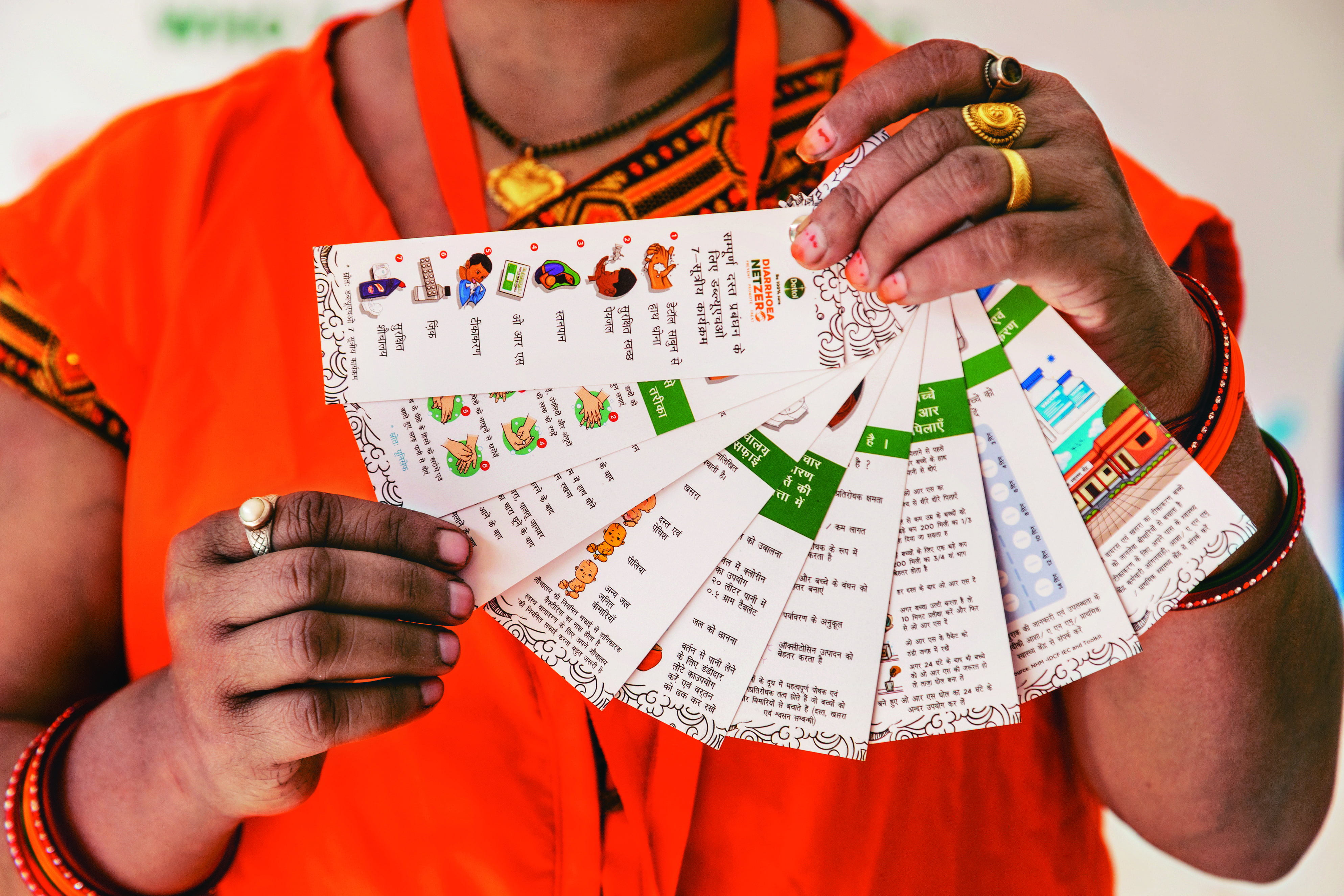
TOWARDS A DIARRHOEA NET ZERO FUTURE
Reckitt’s Dettol Diarrhoea Net Zero (DNZ) programme is driving real-world change in child health outcomes, helping prevent 69,300 diarrhoea cases in 2023–24 in Uttar Pradesh alone
Diarrhoeal disease continues to pose a serious threat to child survival, remaining the third leading cause of death in children under five globally and a primary contributor to childhood malnutrition. Despite national efforts, India still reports a 9.2% prevalence of diarrhoea among children under five (NFHS), highlighting the need for a more integrated, community-led solution. At Reckitt, our purpose is clear: to protect, heal, and nurture in the relentless pursuit of a cleaner and healthier world. This belief is deeply rooted in our work and embodied by Dettol, one of India’s most trusted health brands, safeguarding families for over 90 years.
We believe that hygiene is the foundation of good health, and that prevention must take priority. With this in mind, Reckitt launched the Dettol Diarrhoea Net Zero programme under its flagship initiative Dettol Banega Swasth India, a national campaign that has touched over 298 million lives to date and shaped the country’s hygiene narrative for more than a decade.
India was the first country to introduce ORS through a national programme, recognising it as a cornerstone for diarrhoea management. In 2014, the Government of India launched the Stop Diarrhoea Campaign, reinforcing the WHO 7-Point Plan with a bold aim—zero child deaths due to diarrhoea. Yet, challenges remained. While ORS reached only 34.2% of affected children, zinc adoption was as low as 1%, often due to lack of awareness, poor taste, and confusion about usage.
We saw an opportunity to change this. Drawing on successful global public health models, Reckitt developed a comprehensive approach through a Public–Private–Patient Mix—rooted in community insight, evidence-based interventions, and purpose-led communication.
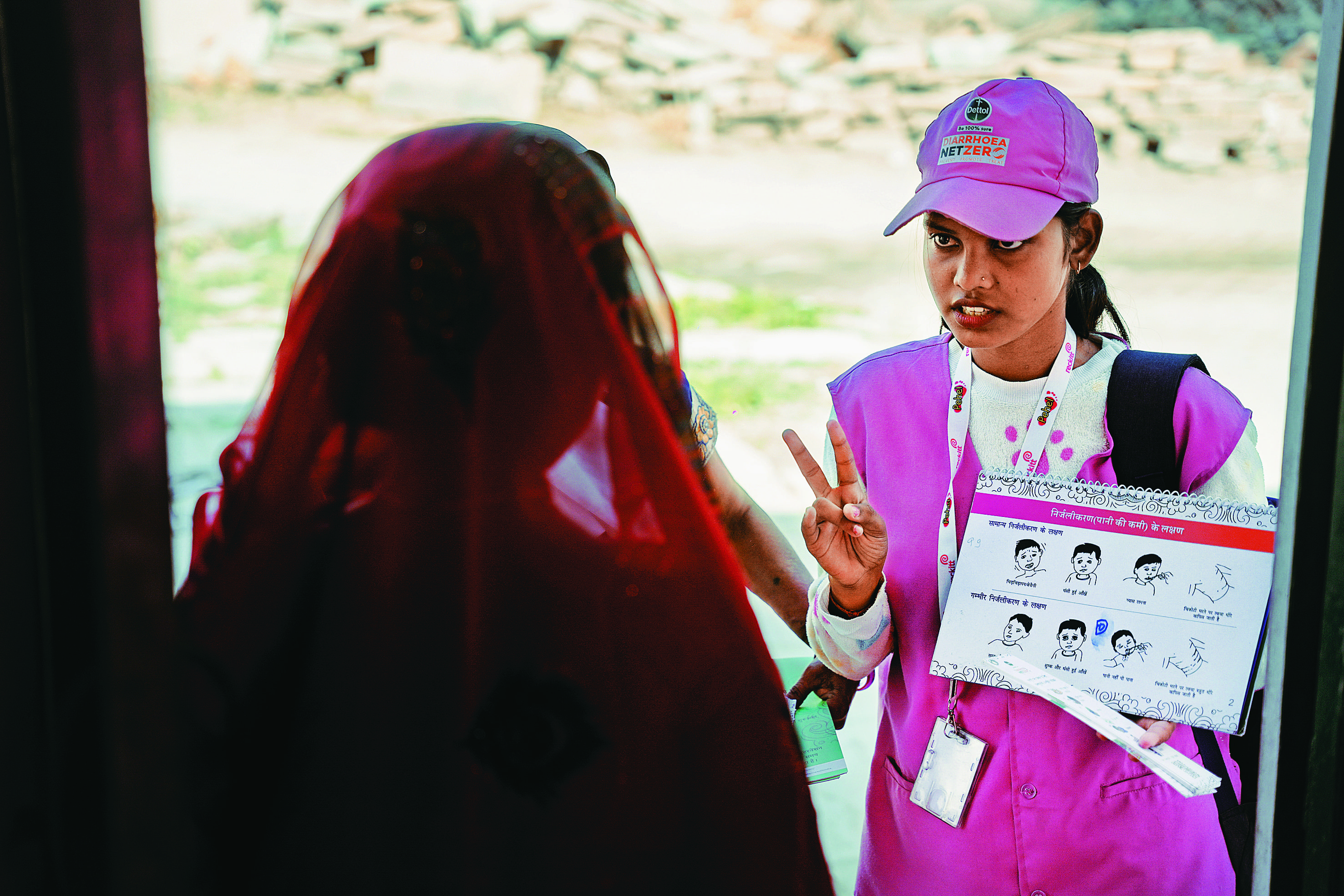
(Above) Doorstep outreach ensures diarrhoea prevention knowledge reaches every household in high-risk communities
The state of Uttar Pradesh, India’s most populous with over 20 crore citizens, was identified as a high-need geography. Under the leadership of Hon’ble Chief Minister Yogi Adityanath, the state has made remarkable improvements in child health, showing strong political will and openness to collaborative action.
With active support from the Government of Uttar Pradesh, Reckitt introduced Dettol Diarrhoea Net Zero, anchored in prevention, promotion and treatment.
One of the programme’s most tangible tools is the Dettol Diarrhoea Net Zero Life-Saving Kit—a reusable, culturally resonant hygiene kit designed for rural households and caregivers. The kit includes:
- Zinc tablets and ORS sachets with illustrated usage guidance
- Dettol soap and hand sanitiser for germ protection
- IEC materials in local languages explaining symptoms, myths, and solutions
- A durable, reusable tin box, designed not just as packaging but as a lasting household utility
This thoughtful design helped the kit go beyond a one-time intervention. It became a visible symbol of hygiene in households, enabling habit formation and knowledge reinforcement—especially among new mothers and caregivers. By making it aspirational and accessible, we ensured that the science of diarrhoea prevention stayed within arm’s reach.
Reckitt also trained over 30,000 “Gulabi Didis”, trusted local women health volunteers who engaged in one-on-one counselling, small group sessions, and community meetings. Their outreach was powered by empathy and local credibility, helping translate medical information into meaningful, everyday action.
The programme further benefitted from a robust behaviour change strategy that incorporated:
- Culturally adaptive content addressing taste preferences and usage concerns
- Narrative storytelling and local dialect videos for rural audiences
- Engagement with faith leaders and teachers to extend reach
- A durable, reusable tin box, designed not just as packaging but as a lasting household utility
Scale and Impact
- Directly reached over 1.4 million households in rural and peri-urban areas
- Trained 30,000 Gulabi Didis as local health champions
- Distributed 14,000 reusable kits to under-five households
- Prevented 69,300 diarrhoea cases, based on programmatic evaluation
- Achieved an economic impact of ₹12.6 crore, via reduced medical costs, transport, and absenteeism
This initiative was also referred to as “Project Sunshine”, symbolising our hope for every child to grow up healthy, safe, and free from preventable disease.
This campaign is a shining example of what’s possible when purpose-driven brands partner with forward-looking governments. The Dettol Diarrhoea Net Zero initiative is a collaboration between Reckitt and one of India’s most widely read publications, with a readership of over 6.5 crore, ensuring nationwide visibility and trust.
The effort has also been acknowledged as part of India’s larger public health transformation, complementing other national programmes and aligning with the Sustainable Development Goals (SDGs), especially those targeting child health, WASH (Water, Sanitation, Hygiene), and health equity.
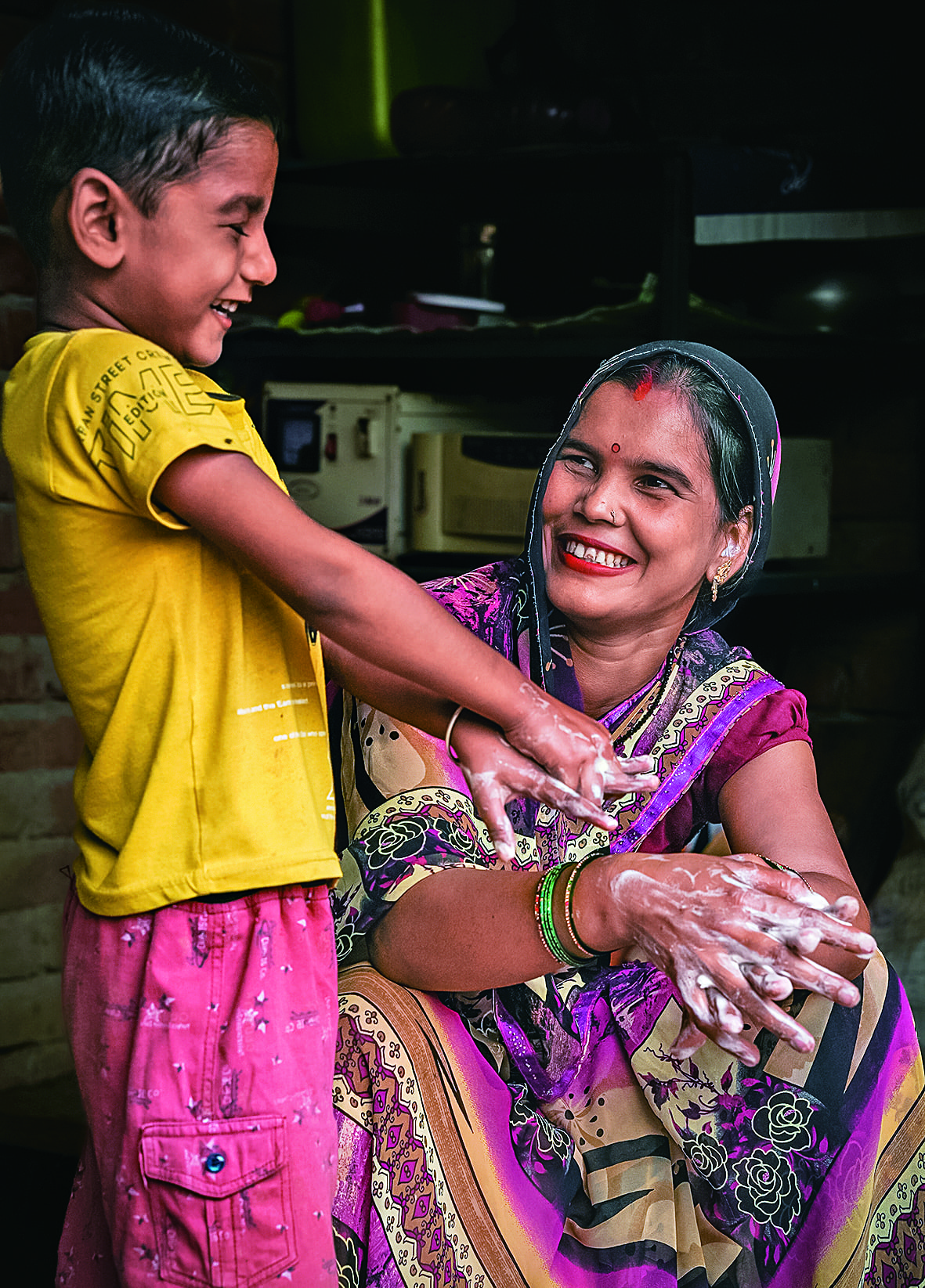
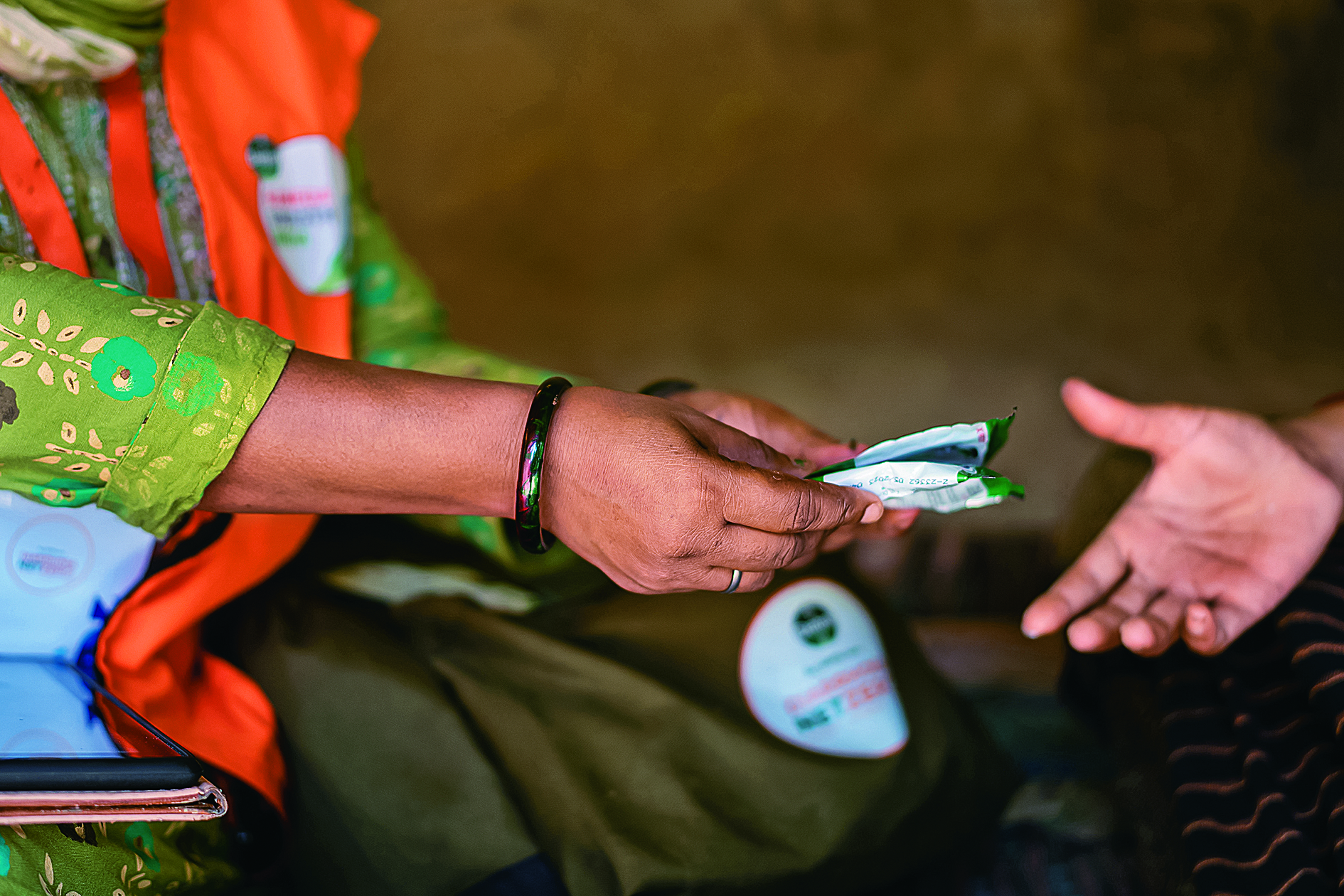
(Above) Access to ORS, along with regular handwashing, is critical for preventing diarrhoeal diseases
The journey doesn’t end here. With continued support from the Government of Uttar Pradesh, Reckitt is committed to expanding this model to other high-burden regions, evolving the kit further based on user feedback, and integrating tech-led hygiene learning into schools and anganwadi centres.
Because when we give families the tools and knowledge they need— supported by purpose, powered by science—we create lasting change. And we bring India closer to a future where no child dies of a preventable illness like diarrhoea.
We look at some stories of change.
Married off at 16 and a mother of two children at 23, Babita Kumari lost her seven-month child some time ago. “As a young mother, I had limited knowledge of what to do when my son got severe diarrhoea. By the time we managed to reach the only hospital, it was too late. I had no idea that something as simple as giving a powder (ORS) in water, and washing hands could have saved my child”, she says, tears rolling down her eyes.
Her husband pats her back and gently whispers something to her. This calms her down, and she composes herself. “I will take care of my two children and do everything that I learnt today,” she says with a mother’s strength. Babita just witnessed a street play in her village, which talked about simple measures to maintain hygiene in everyday life, thus preventing infant diarrhoea. And even though cases have reduced , the disease continues to remain a serious concern.
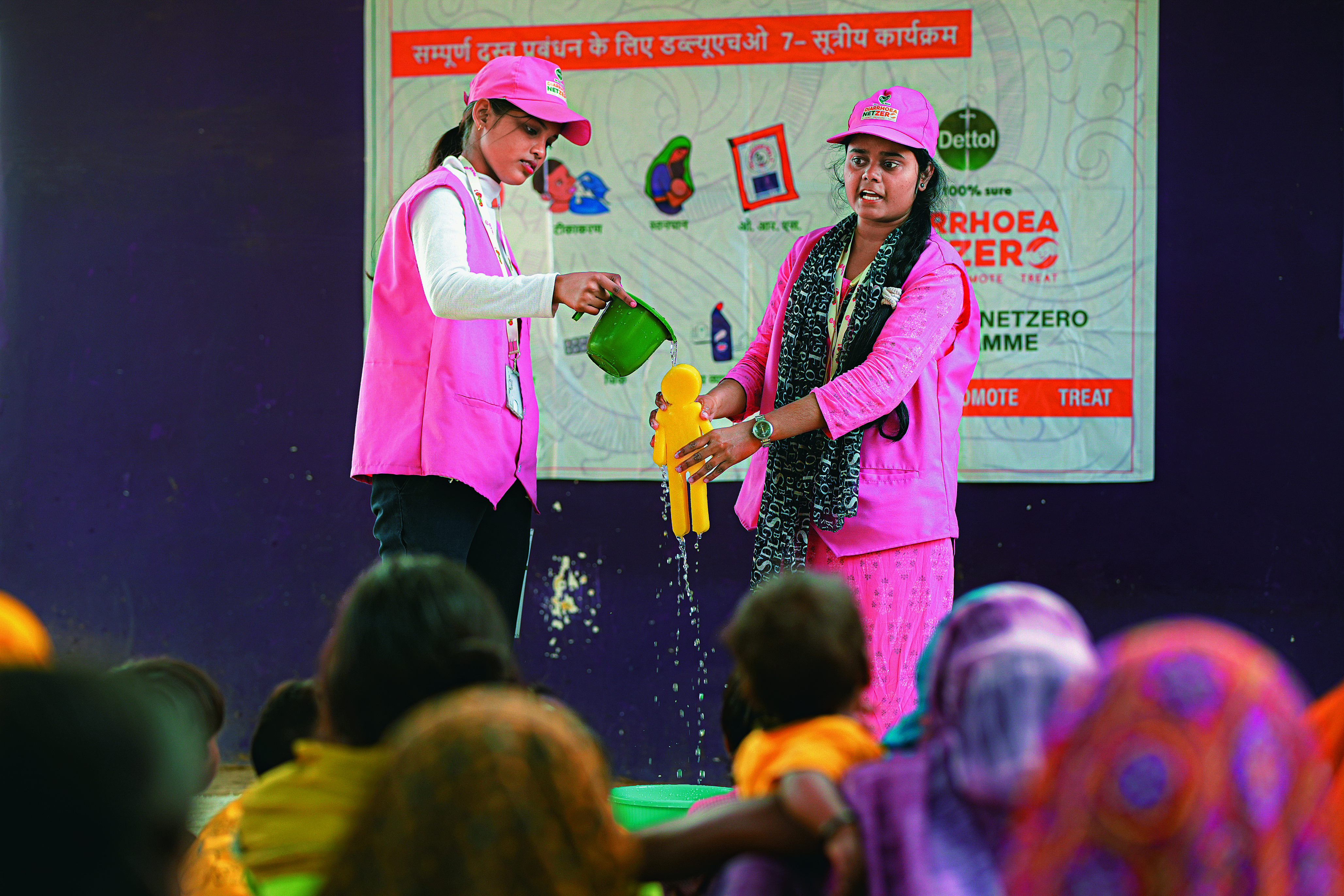
(Above) Practical demonstrations—such as using a sponge to illustrate how dehydration can drain essential fluids from an infant’s body
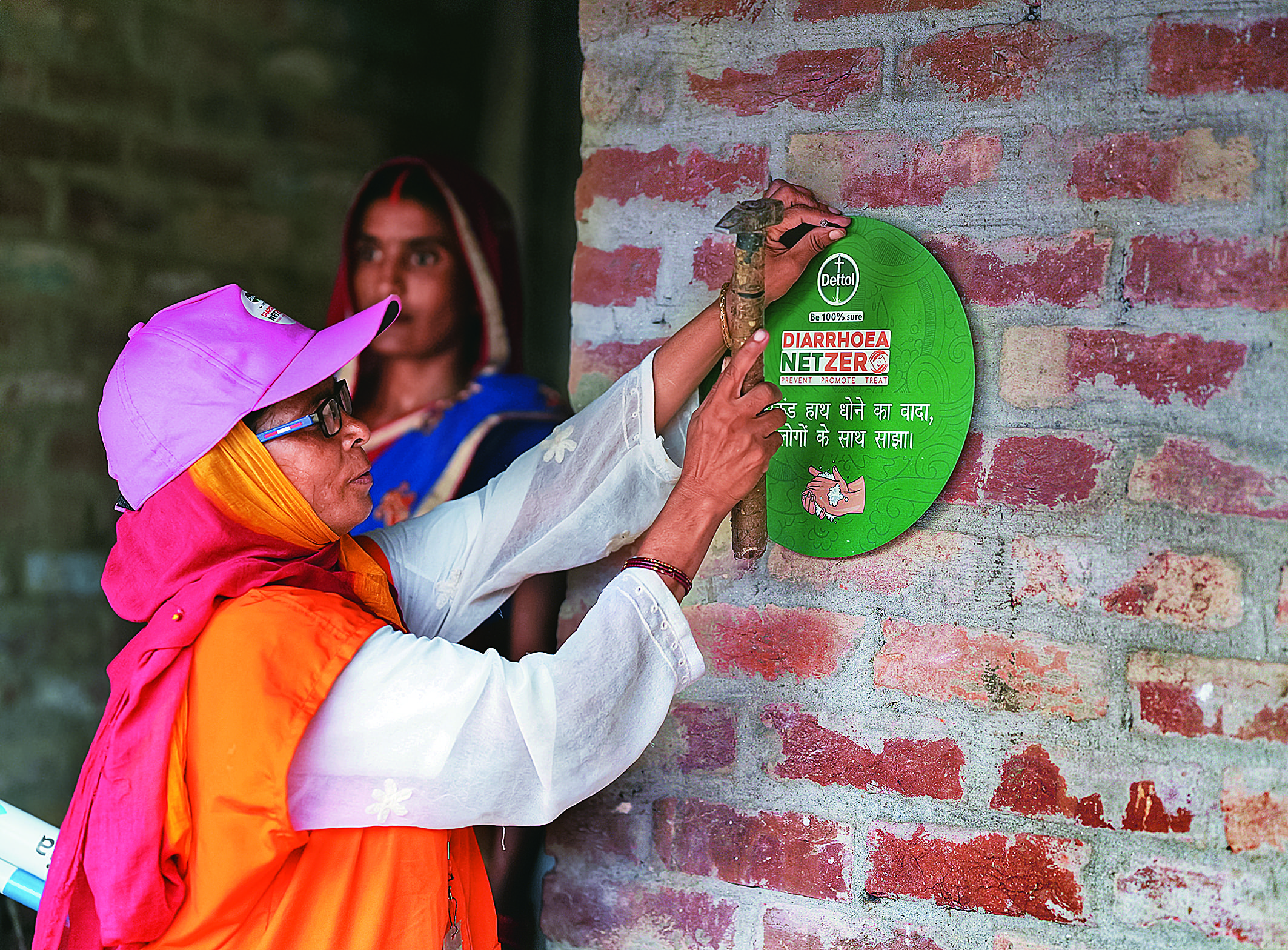
(Above) Campaign materials enable institutional allies to amplify hygiene messaging across healthcare and government systems
For Reckitt, addressing this became a mission. The seed idea became Project Hope in 2017, the cornerstone of the initiative, and a market-based, sustainable model for preventing diarrhoea and improving sanitation practices. Building on its success, Reckitt then introduced Dettol Hygiene Impact Bond (DHIB) in 2020, which focussed on ensuring timely interventions, accountability in health financing, and maximised impact at the grassroot level. The aim: saving one lakh under-five children by preventing diarrhoea and enabling early access to treatment. DNIB’s transition to 2022’s Dettol Diarrhoea Net Zero (DNZ) marks Reckitt’s most ambitious commitment yet – aiming to eliminate childhood diarrhoeal deaths within the next three years. It also reflects the company’s evolved approach, transitioning from addressing symptoms to tackling the root causes.
For a company that is big on strategy, research and data, DNZ followed the same path, but with a difference. At Reckitt, community-led initiatives are deeply ensconced in the culture of communities. So be it wall paintings with key messages; thousands of nukkad naataks (street plays); or amping communication to mark important dates such as World Health Day, Immunisation Week, Global Handwashing Day, World Toilet Day, etc.; or catchy songs by renowned folk artists, Reckitt is getting up, close, and personal with its target audience.
Reckitt plans to create value impacting two major development areas under Aspirational Block Programmes, ‘Health and Nutrition’ and ‘Education’ (with a focus on Hygiene Education), through convergence and collaboration with its strong allies from civil society and provincial governments in 500 identified Aspirational Blocks.
The effect of these strategies has been remarkable on the ground, and resonates with Reckitt’s DNZ, which is rooted in the WHO seven-point plan. Focussing on indicators related to diarrhoea management, these include improved access to safe drinking water; improved sanitation; improved hygiene practices; early and effective treatment; improved access to vaccines; community-based health promotion; and strengthening health systems. Using it as a benchmark makes the programme holistic and unique, with the tagline: “Prevent, Promote, Treat”.
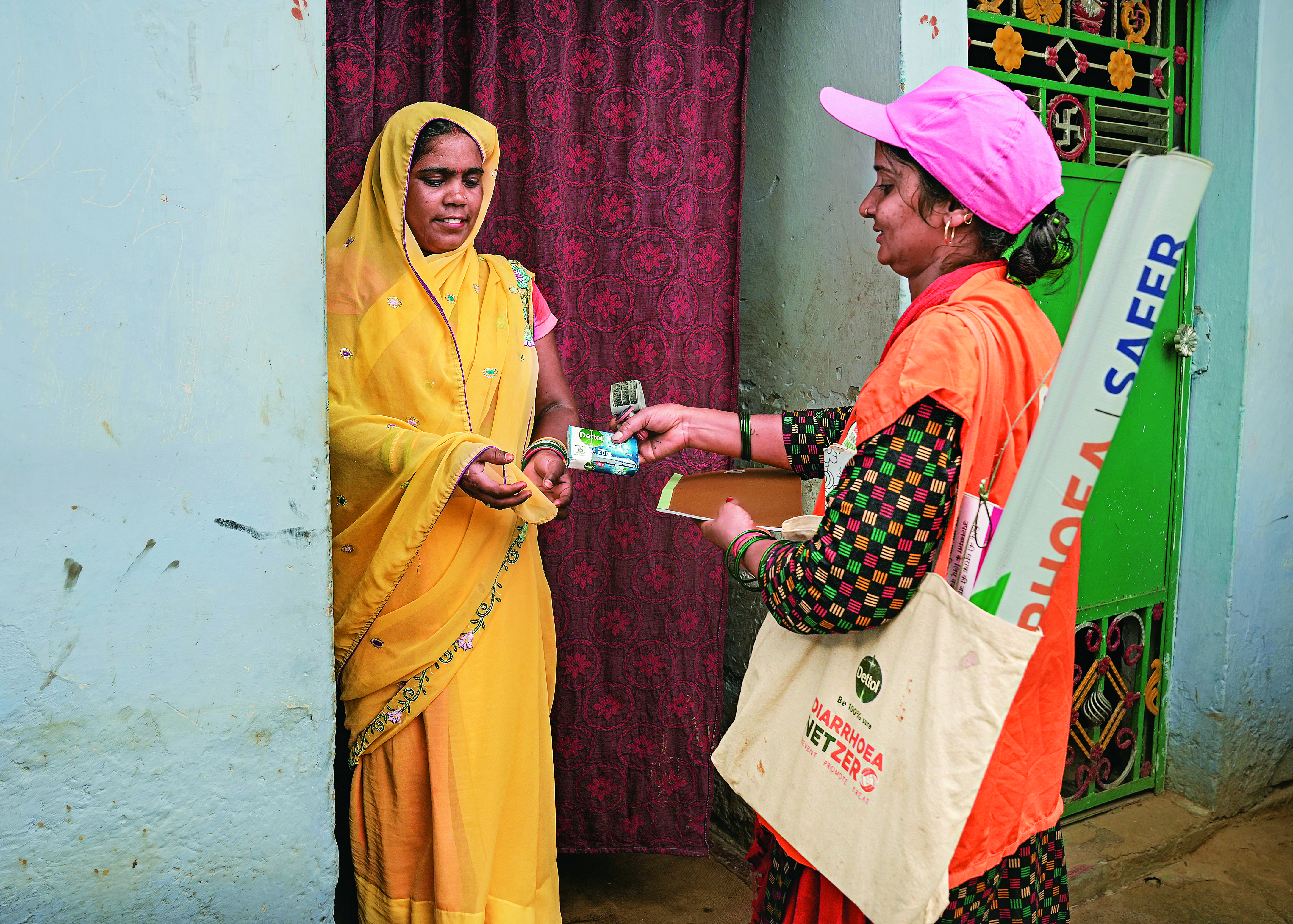
Hygiene tools like soaps and sanitisers, make clean habits accessible and repeatable
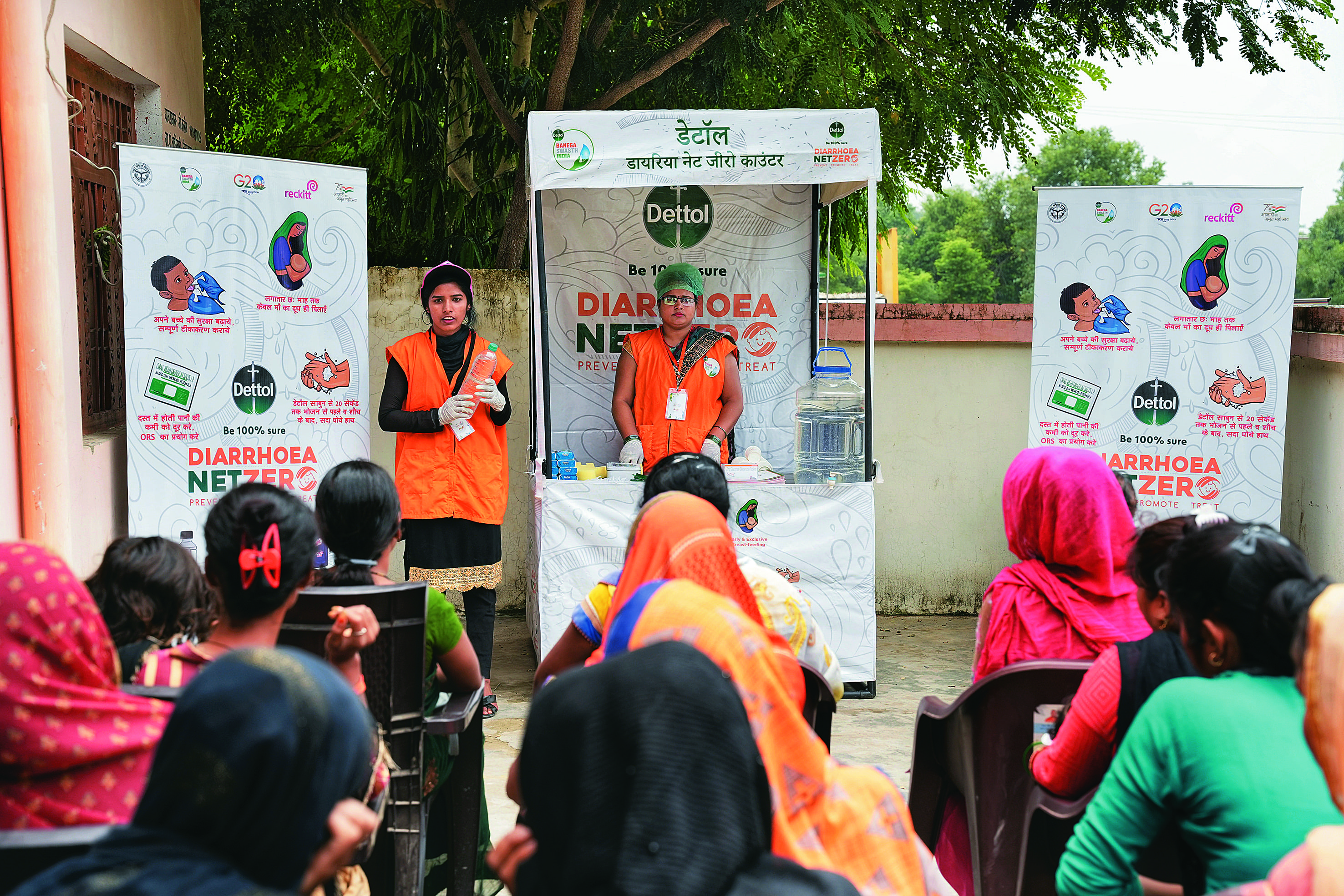
(Left) Interactive learning modules simplify diarrhoea prevention for new mothers and children in rural settings
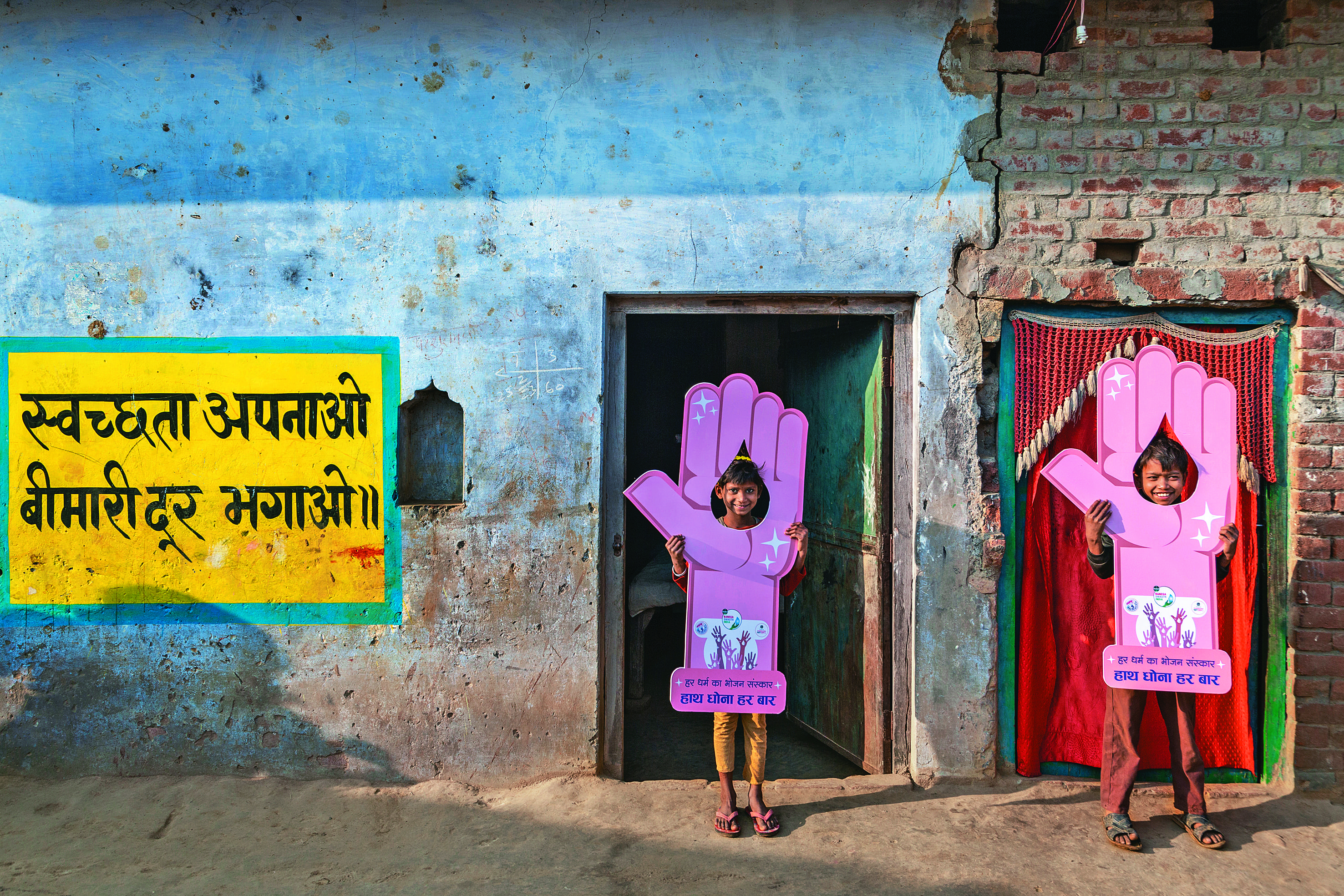
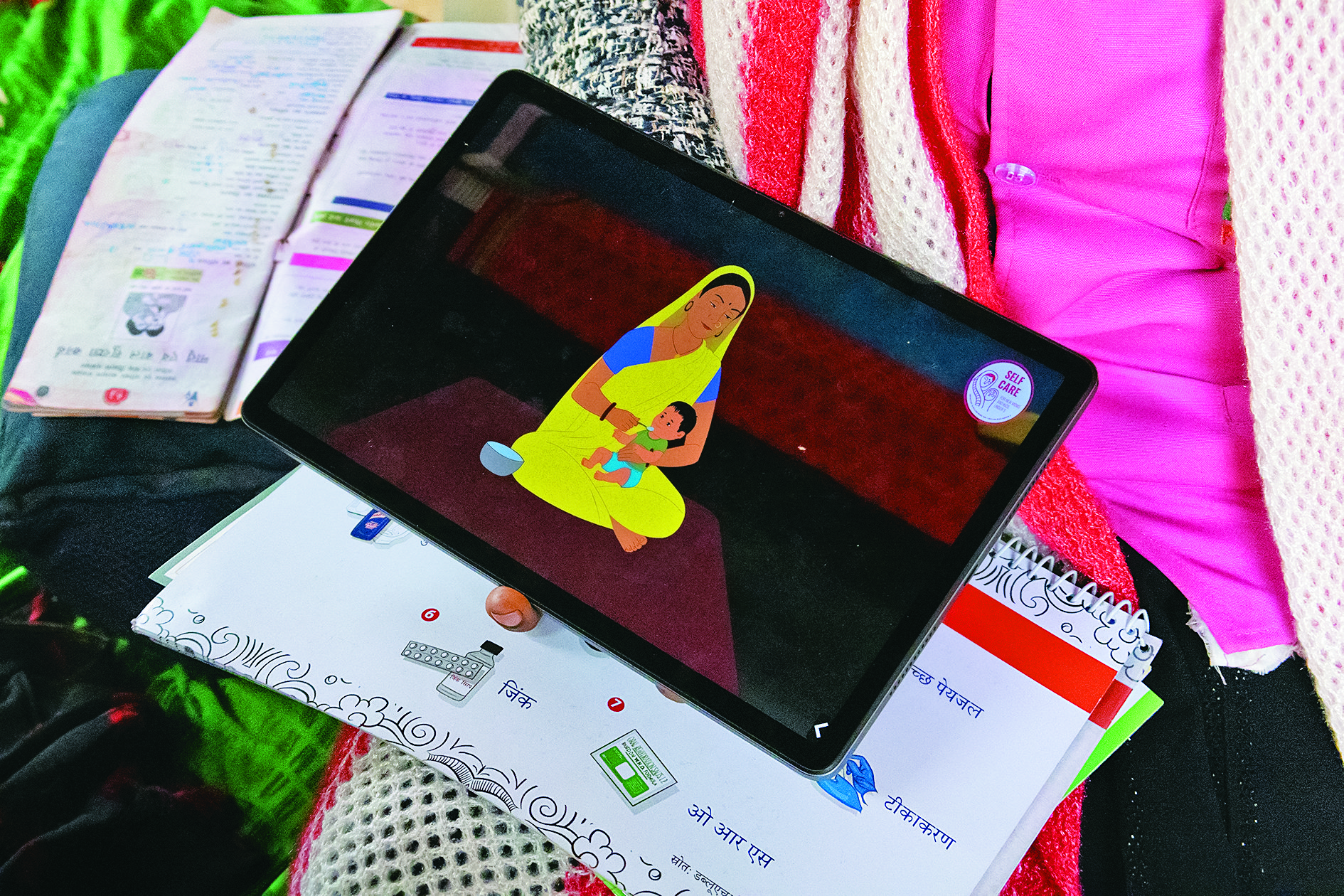
(Above) Early health education fosters lasting behavioural change and improves disease resilience in children
The programme is also a reflection of Reckitt’s commitment to having ownership, care, creation and delivery as a core part of its purpose to protect, heal and nurture in the relentless pursuit of a cleaner, healthier world. Over all as well, the company’s initiatives go beyond traditional philosophy, focussing on long-term impact, community empowerment, and scalable solutions to address critical public health challenges.
Volunteers facilitate access to clean water sources, promote the use of oral rehydration solutions, and encourage proper sanitation practices. A team of 30,000 such volunteers work as a collective force to support communities. And through community outreach initiatives, they strive to create an enabling environment wherein caregivers feel supported and empowered to implement preventive measures effectively.
Beyond the numbers, DNZ has fostered a cultural shift towards preventive healthcare, ensuring early symptom recognition, oral rehydration solution (ORS) and zinc usage, improved sanitation, and hygiene education at the grassroots level.
A journey to some of the villages across the 40 districts in Uttar Pradesh shows what it takes to build such an initiative. Happy snapshots of on-ground impact: Anganwadi children giggling and shoving each other while washing their hands with soap and water, Gulabi Didis interacting with their mothers in a community meeting, and resounding laughter at an animated movie about bacteria and soap bubbles fighting it out.
Instances such as these have emerged from Reckitt’s keen strategies on changing behaviours and habits. The impact of DNZ, thus, can be seen across three key areas: Caregiving absenteeism - Parents who previously had to take time off work to care for sick children were able to continue working, leading to a total economic savings of Rs 6 crore; Medical Expenses: Families saved Rs 5.9 crore on hospital visits, medication and treatment costs; Transportation Costs: The reduction in diarrhoea cases led to a decrease in patient travel, amounting to savings worth Rs 69.3 lakh.
What’s more, the programme has recently been recognised at the 7th ICC Social Impact Awards 2025 in the field of healthcare with the special Jury appreciation. Reckitt also received the Global health leadership award for public health impact from IHW Council and was honoured by Shri Brijesh Pathak, Deputy Chief Minister of Uttar Pradesh and Anandiben Patel Governor of Uttar Pradesh for Dettol Diarrhoea Net Zero Initiative.
As the temperatures soared in her one-room house and her two-and-a-halfyear- old son Satyam lay listless after yet another episode of diarrhoea, Chandni had run out of prayers as she stroked her son’s forehead.
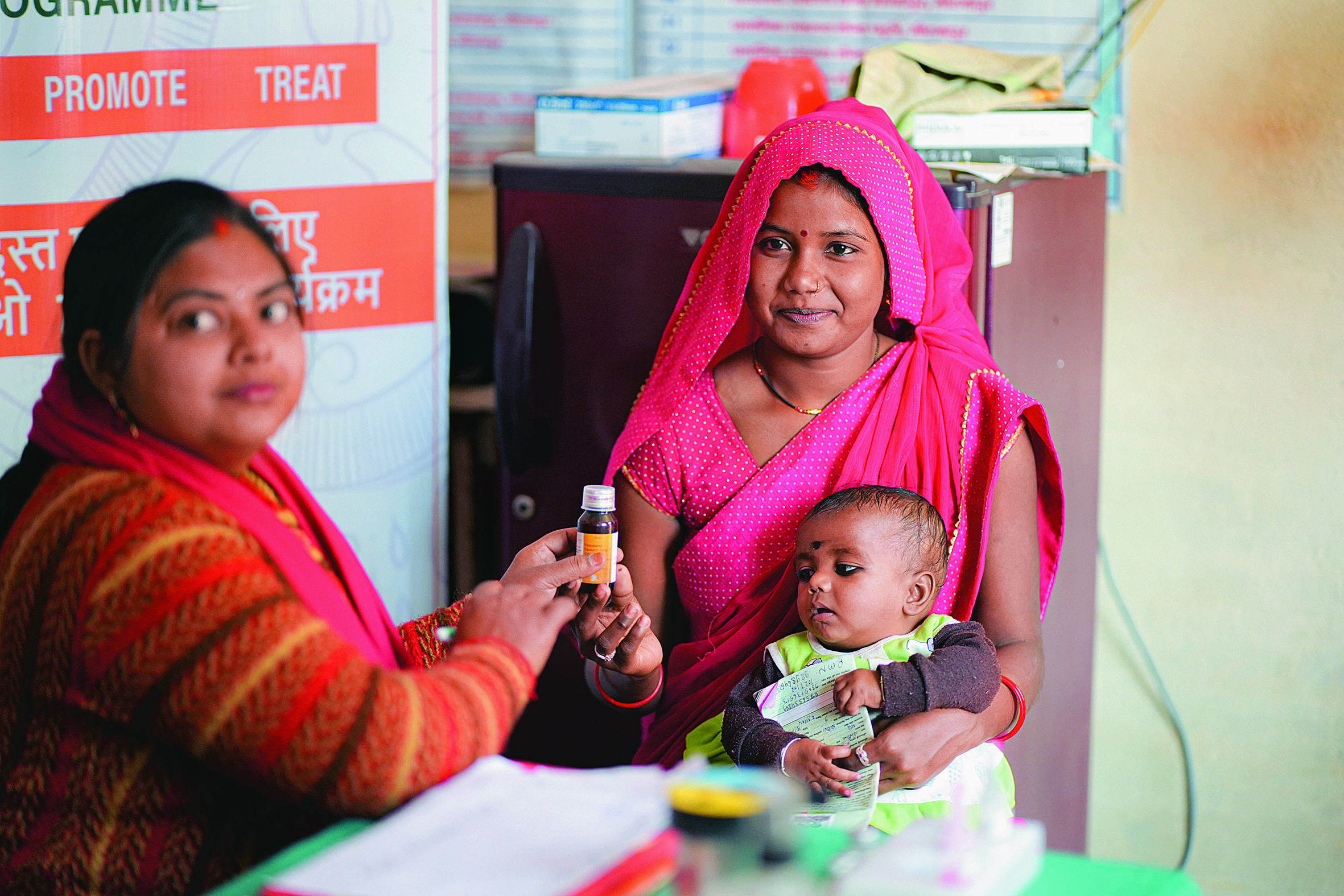
(Left) Integrating medical consultation with health education ensures both prevention and treatment are addressed at source
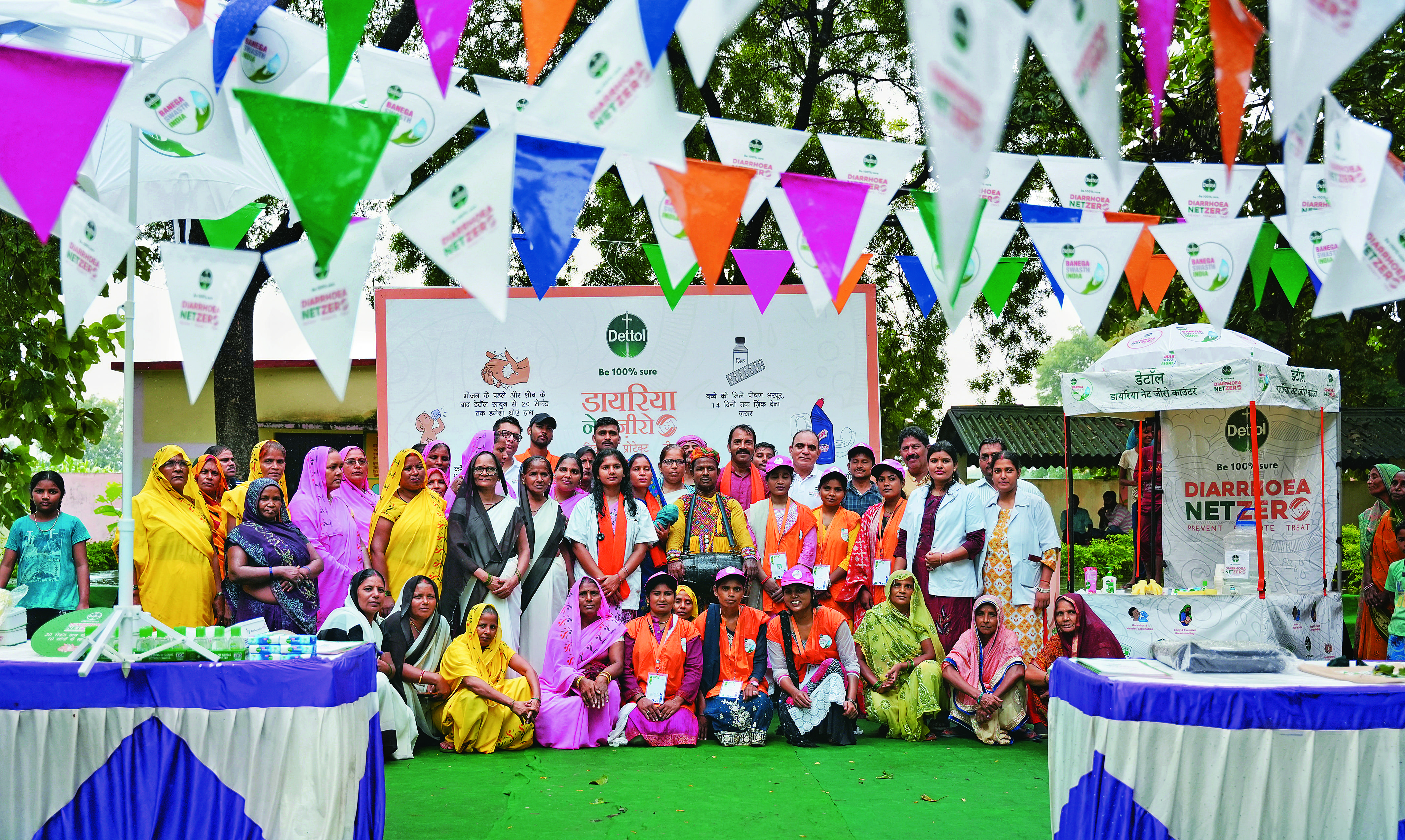
A comprehensive focus on diarrhoea management reinforces the campaign’s core pillars: prevent, promote, and treat
“This is probably the seventh time he fell prey to the infection. It’s like this every 15 to 20 days. With my older son also to take care of, getting to a hospital is a challenge too. If it wasn’t for Reckitt, I don’t know what I would have done,” says Chandni, a resident of Mirzapur.
Not only did she get assistance of Rs 6,000 to get Satyam admitted for malnutrition (which the doctors told her made him prone to infections), Chandni also learnt what she should do for prevention and cure of diarrhoea.
“Now I wash my hands regularly, as do my husband and children. I always keep ORS at home. My husband works as a barber; not going to work in case of illness means loss of a day’s earnings,” shares Chandni.
Data from DNZ shows that each episode of diarrhoea results in a caregiver losing two days of work, leading to a loss of Rs 434 a day in Uttar Pradesh (median wage). Add to this worries such as transportation costs, lost wages, and long distances to healthcare centres, and it is clear what discourages families from seeking medical help on time.
To reduce these barriers, Reckitt has established community-based ORS and zinc distribution points (ORS Corners) in high-risk areas, ensuring immediate access to life-saving treatment. These counters ensure free distribution of ORS and zinc during the monsoon season, when children are most vulnerable to diarrhoea.
The exercise is a leaf from the book of cultural traditions, such as Chabeel, wherein a cool sweet drink is offered to people on the roads by the Sikh community during the scorching summer months of India.
Reckitt’s initiative is not only achieving its goal of preventing deaths from diarrhoea but has also helped in capacity building of the community. Parents have increasingly been able to recognise symptoms and intervened early enough, reducing complications and hospital attendances. This process has built a sense of collective responsibility; they now support one another, exchange knowledge amongst each other, creating healthy habits.
At an ORS Counter in Bahraich, we interact with women, who confidently explain the importance of handwashing, ORS, and zinc supplements — simple yet life-saving measures they once overlooked.
“We never knew that just washing hands properly could save our children from falling sick so often,” said Asmati Maurya, a mother of two. “Now, we follow these practices every day, and we see the difference in our children’s health.” The heart of this initiative lies in education and community outreach. The DNZ programme, clearly does more than just distribute aid; it actively engages with people to instill lasting habits.
With its efforts, Reckitt is slowly but surely turning the tide from ignorance to in-depth knowledge in individuals and communities.
Ask Radhika, a mother in Sitapur, whose confident voice speaks louder than the jingling bangles on her thin hands, “We didn’t know anything about diarrhoea, but now we have an in-depth knowledge of dealing with the illness. We know the symptoms, how to prevent it, and some home remedies as well. The programme has done wonders for us.”
Her friend Urmila pitches in with her bit of experience, when she says, “DNZ has massively helped us in reducing diarrhoea cases in children. As a result, my children are now healthy and fit. We know how to act and what to do when symptoms arise. We also understand the importance of keeping surroundings clean. DNZ has been a game changer in our lives.”
The impact is not limited to communities. Local health workers have reported tangible improvement in the health of children and a reduced burden on local health centres from diarrhoea cases.
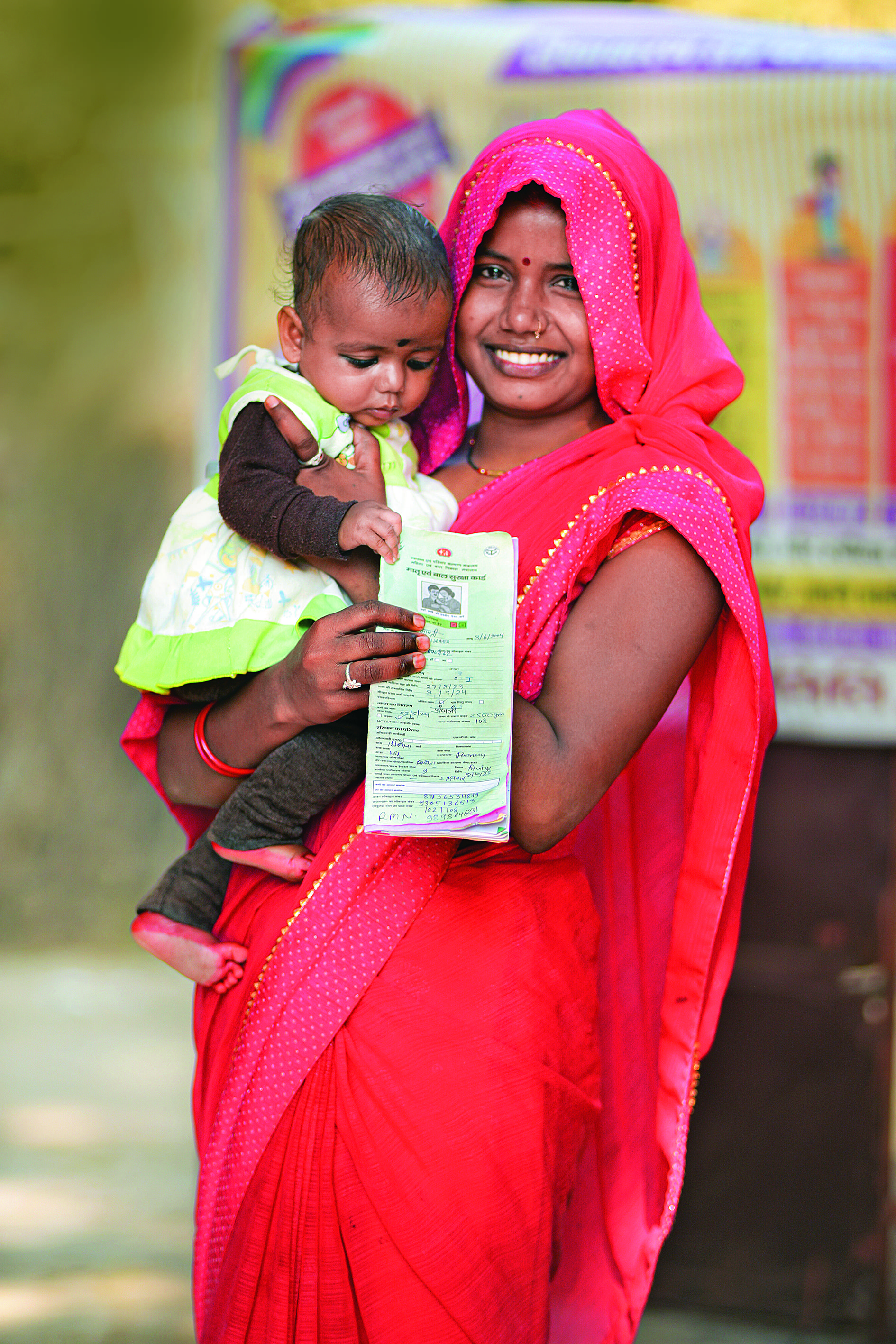
Visual aids bridge awareness gaps, enabling even first-time mothers to adopt critical hygiene practices
Dr Chandwan Singh, a paediatrician, discussed the differences in healthcare practices since the introduction of the initiative. “While we had ORS corners, adding zinc corners and education material have really changed things. There is a far better understanding in the community on diarrhoea prevention and cure. This is important to help us achieve the goal of lowering infant mortality,” he says.
Pancham Rishi Yadav, a community health coordinator in Bahraich sees the story of changes as well. “Nearly 6% of child deaths in our region have been attributed to diarrhoea. Many parents don’t seek medical help on time, simply because they don’t recognise the symptoms or lack access to treatment. But that is changing,” he smiles.
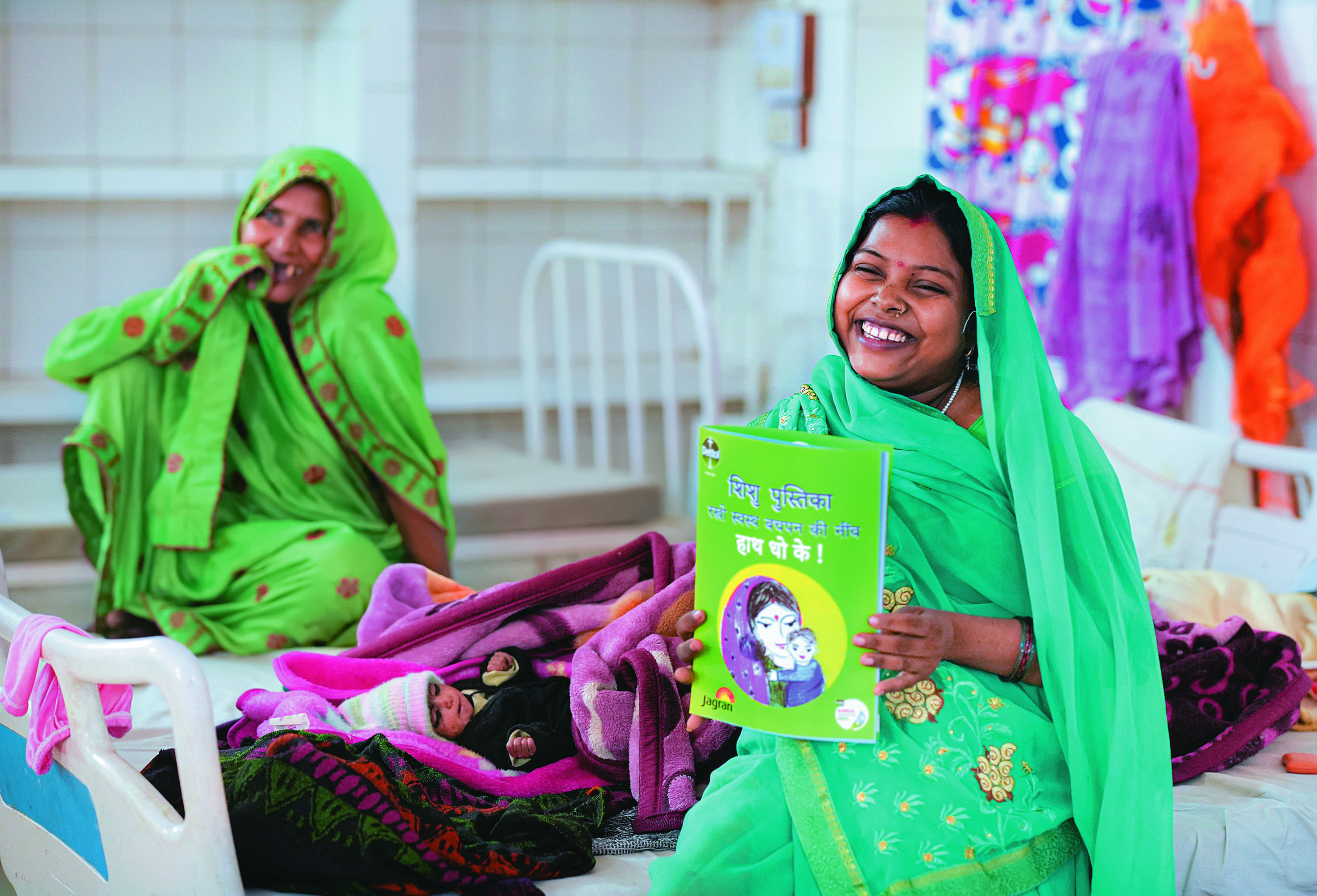
(Above) Recovery-linked education transforms hospital stays into opportunities for long-term health awareness
Distribution of DNZ kits that include ORS, zinc supplements, and hygiene products, has emerged as a crucial factor in the management of cases of diarrhoea at home, reducing the burden on doctors.
At the heart of DNZ initiative is the empowerment of women health volunteers — Gulabi Didis, who serve as grassroots changemakers, helping bridge the gap between healthcare providers and caregivers. By mobilising a vast network of 30,000 volunteers, predominantly comprising women, the programme harnesses the power of grassroots engagement. These volunteers serve as frontline warriors, bridging the gap between healthcare providers and caregivers within communities.
Stories of change are a beautiful reminder of the cascading effect of good work. Ask 23-year-old Anchal Vishwakarma from Mirzapur, who smiles ear to ear as she talks of what being a Gulabi Didi means to her. When she started out, she was all of 18; today she is 23, beaming with confidence.
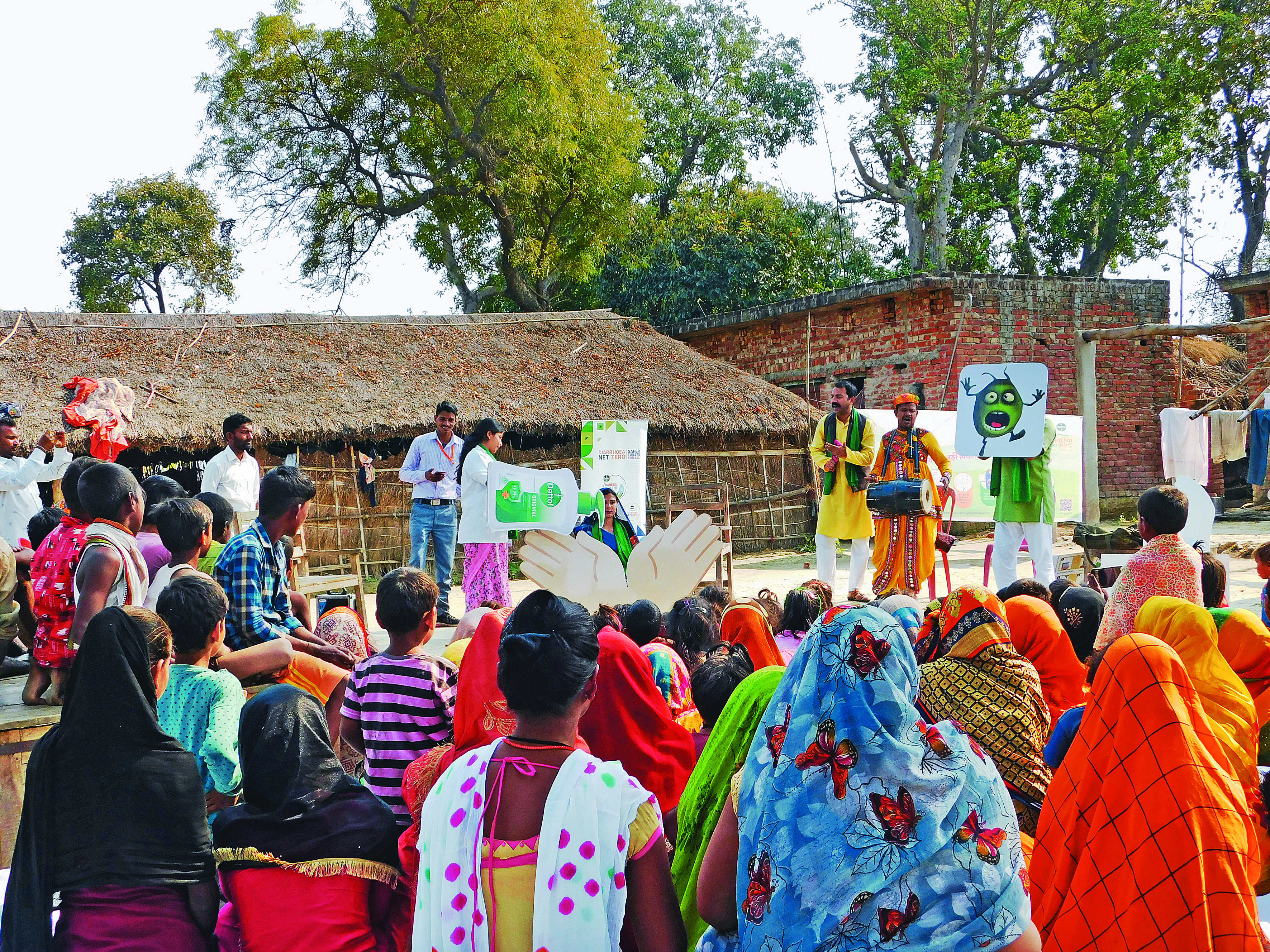
(Above) Street theatre breaks barriers of literacy, using storytelling to highlight the life-saving power of handwashing
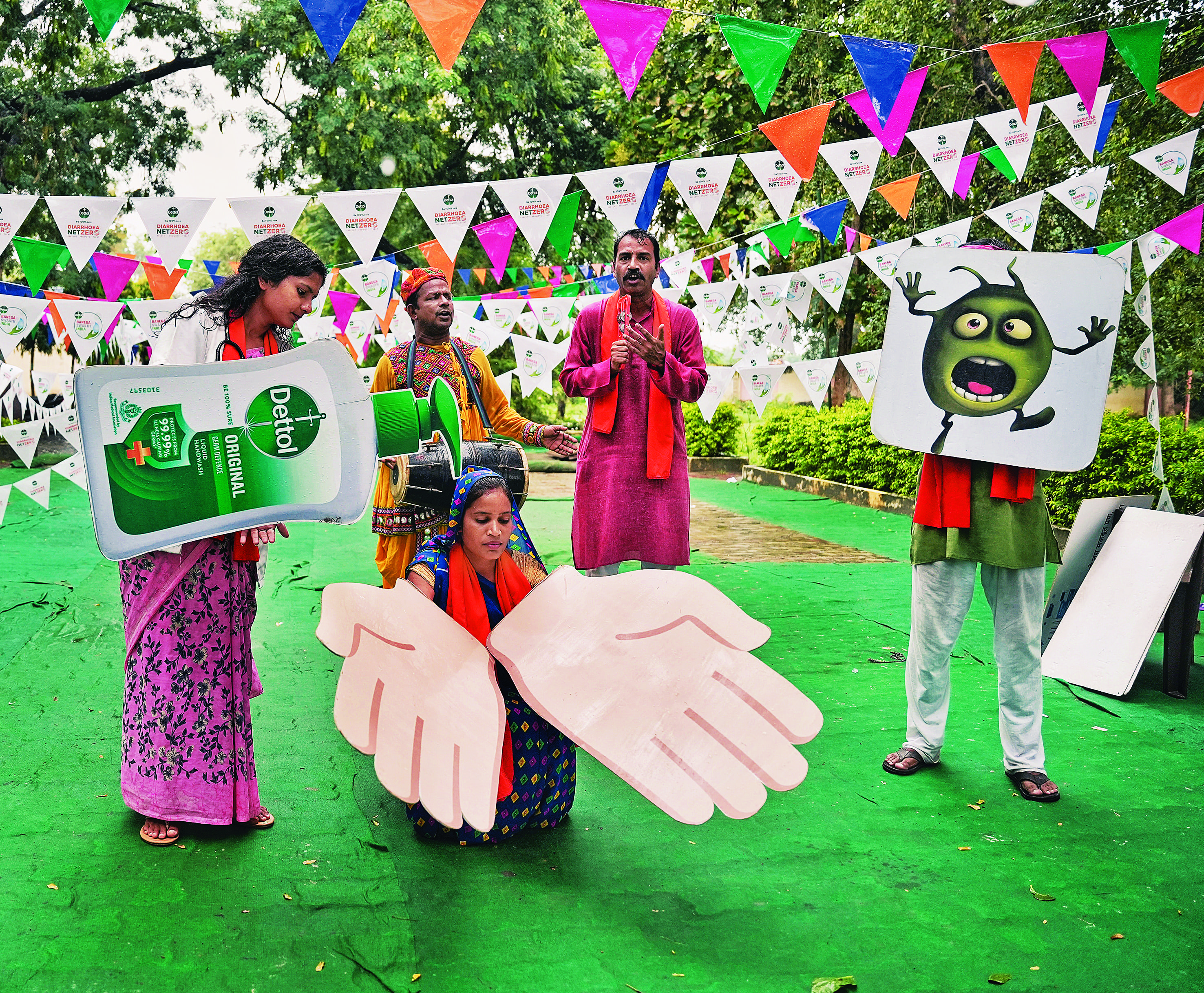
(Above) Repeated visual reinforcement embeds hygiene habits into community culture, especially among high-risk groups
“I still remember the initial days on field when I was a bag of nerves. The more I met families, the better I felt about being able to make a positive change. It is the community meetings that are particularly interesting,” she smiles. The best part about her work, she says, is the fact that it not only helps her earn a living and be independent but also helps others.
“When I ride a scooty that I bought from my savings, I feel on top of the world -- free and independent. And when I give a ride to my father and brother, I realise women are no less than men. But the best feeling is when villagers greet me and acknowledge me with their smiles. Being a Gulabi Didi has given me an identity that I am proud of.”
Anchal is just one of the 30,000 women whose lives have changed and they are, in turn, helping transform innumerable lives, one knock on a village door at a time.
Reckitt is deeply committed to playing a key role in India’s health transformation journey, ensuring that its efforts drive real, measurable change aligned with the vision of Viksit Bharat by 2047.
It has, however, come with its share of challenges. Implementing large-scale public health programmes comes with significant roadblocks, particularly in rural and underserved communities where healthcare access, awareness, and behaviour change require sustained interventions.
Through its work on the DNZ programme in Uttar Pradesh, Reckitt has identified three major barriers that hinder timely healthcare access: lack of awareness, logistical constraints, and limitations in healthcare facilities. To battle it, the programme adopts a holistic approach, extending beyond mere education to provide practical support to caregivers.
The initiative doesn’t just stop at healthcare — it aims to encourage sustainable behaviour change. We witnessed hygiene education sessions where children were taught through songs and interactive activities, making learning both fun and memorable.
The impact has been far-reaching. In some villages, we observed families keeping clean drinking water in covered containers, a small but vital shift from previous practices. In others, communities have adopted regular sanitation habits, reducing the spread of infections.
As we left the villages, the voices of the ones we met, the hopeful smiles of children, the determination of health workers, and the gratitude of parents who once felt helpless, were the live example of Net Zero’s successful implementation and positive change in society. The people’s wide smiles and the sparkle in their eyes made us believe that most times, a small but crucial change can make all the difference. Reckitt’s Diarrhoea Net Zero isn’t just a campaign -- it’s a movement that is empowering communities, saving lives, and paving the way for a healthier tomorrow.
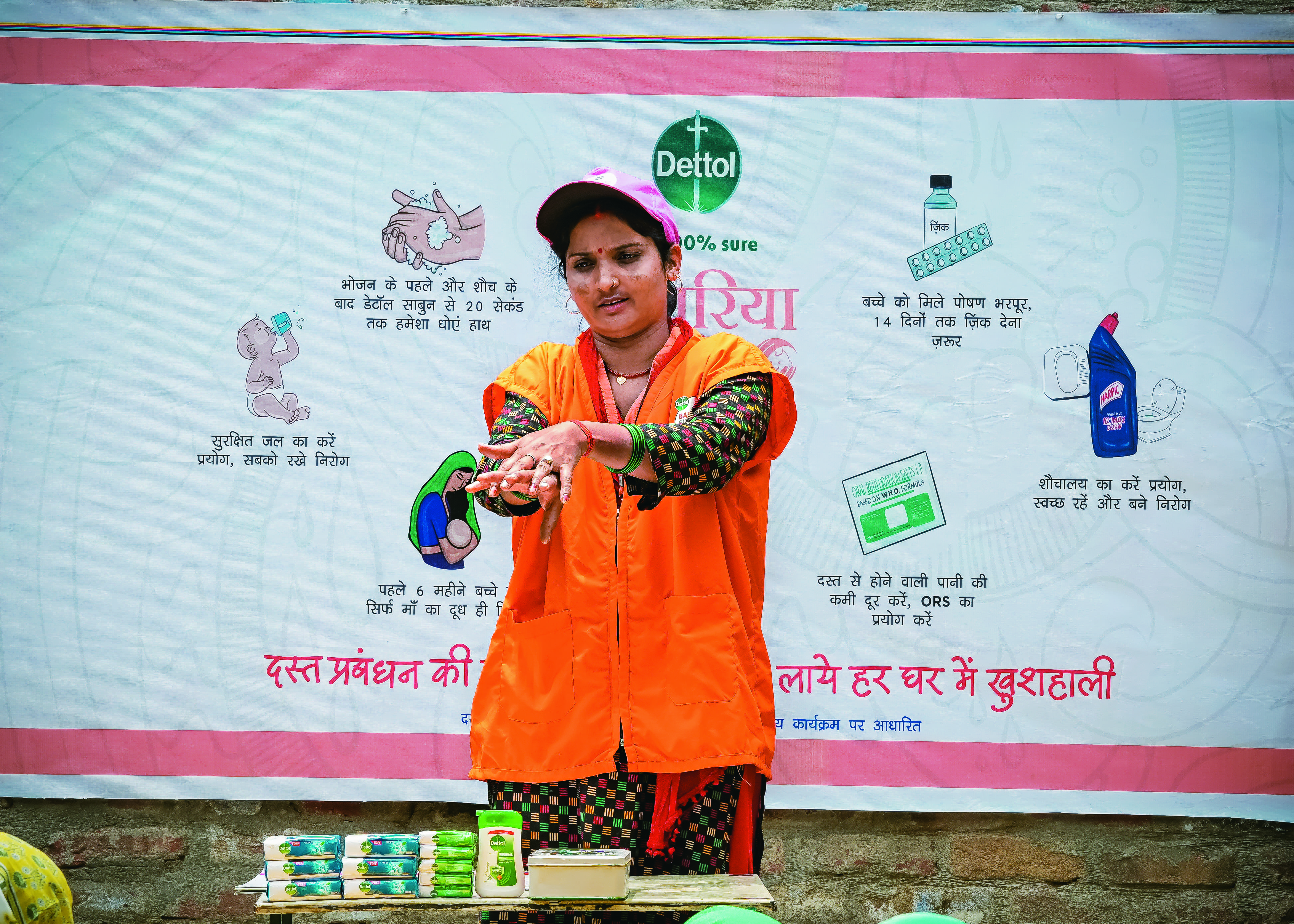
Through its CSR endeavours, Reckitt is committed to playing a key role in India’s health transformation journey, ensuring its efforts drive real, measurable change aligned with the vision of Viksit Bharat by 2047. Mr Ravi Bhatnagar, Director, External Affairs and Partnerships, Reckitt – South Asia, talks about the company’s strategy for the same, and more. Edited excerpts:
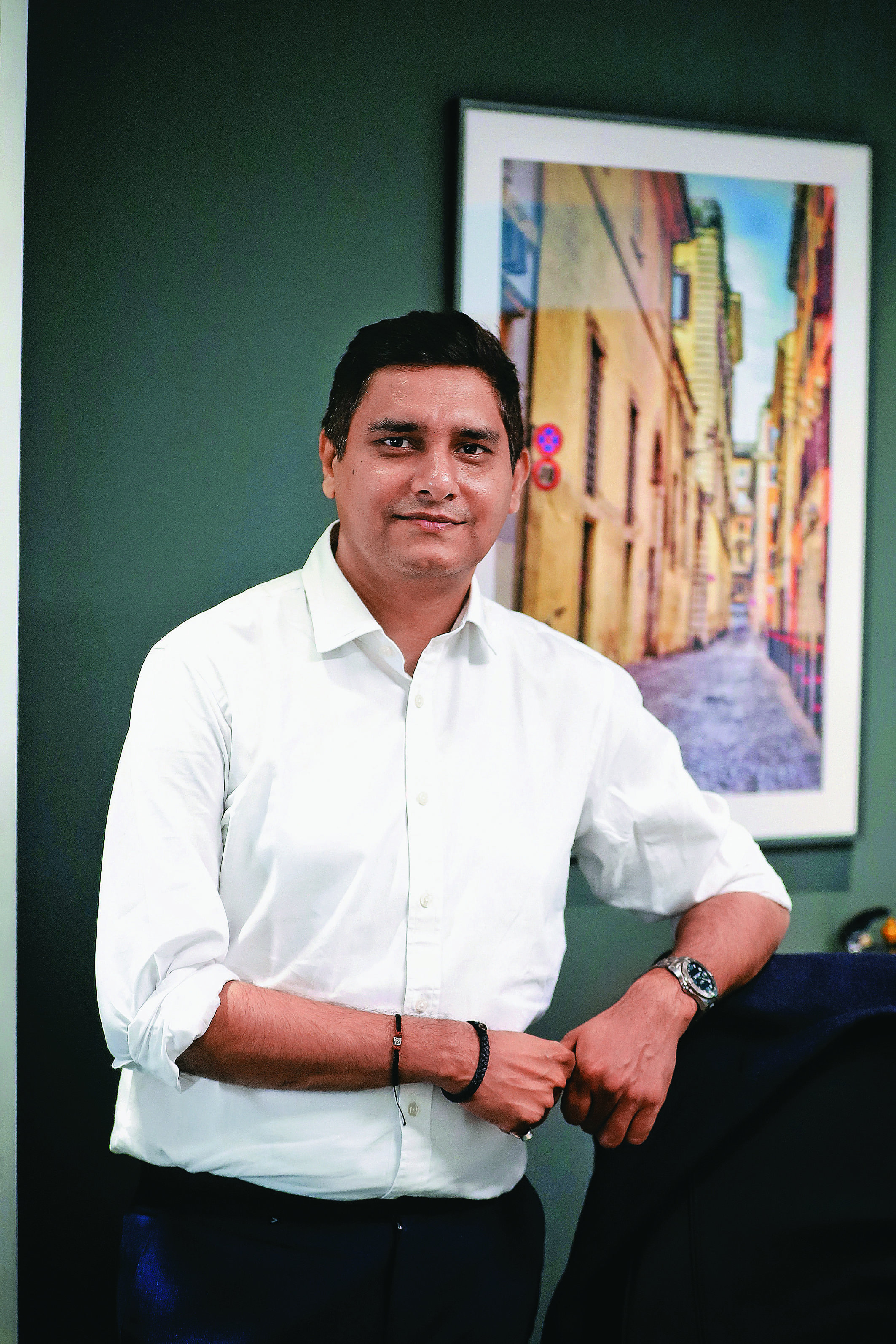
We aim to create sustained improvements in hygiene, sanitation, self-care, and child health, contributing to India’s broader development goals. Our focus is on ensuring that the most backward blocks are brought on par with more developed regions.
We plan to continue Hygiene Olympiads to take it to 50 million children. Our emphasis is also on gamification, investing in cultural nudges to make programmes relevant with time, using generative AI.
Diarrhoea remains one of the leading causes of child mortality in India, despite being entirely preventable. Recognising this, Diarrhoea Net Zero (DNZ) was launched under Dettol Banega Swasth India in collaboration with Jagran Pehel, with the ambitious goal of achieving net zero diarrhoearelated deaths among children under five in Uttar Pradesh.
Key Impact of DNZ (2023-24) includes direct engagement with 1.4 million households through community outreach; training 30,000 Gulabi Didis as community health leaders; distributing 14,000 life-saving kits to children under five; preventing 69,300 diarrhoea cases; and achieving an economic impact of Rs 12.6 crore. The initiative was recently recognised at the 7th ICC Social Impact Awards 2025 in the field of healthcare with special jury appreciation
One of the biggest challenges is the delay in seeking care due to low awareness about diarrhoea symptoms and treatment among caregivers. Our Gulabi Didis educate caregivers on early symptom recognition, proper handwashing, and the importance of ORS and zinc therapy.
Access to healthcare facilities in remote areas is another challenge. So, we have established community-based ORS and zinc distribution points in high-risk areas, ensuring immediate access to life-saving treatment. Our mobile health units reach remote villages, bringing essential healthcare closer to families.
Many public healthcare centres are overburdened, with shortages of ORS, zinc, and antibiotics. To address this, Reckitt has worked to strengthen supply chain management to ensure a continuous stock of essential medicines in targeted districts. Additionally, we are collaborating with private healthcare providers to build their capacity.
Reckitt’s CSR is built on a holistic and scalable approach to improving hygiene, health, and sanitation in India. Our Dettol Banega Swasth India (DBSI), which has been at the forefront of hygiene education and behaviour change, has created 34 billion-plus handwashing occasions annually and engaged one million schools with a structured hygiene curriculum. Our goal is to reduce absenteeism by 45% by ensuring that children practice proper handwashing and sanitation habits. Through our participation in the Aspirational Blocks Programme, we are working in 100 underserved regions, with plans to expand to 500 blocks.




